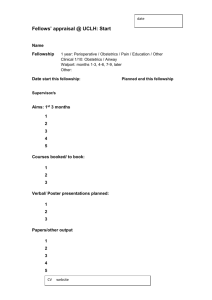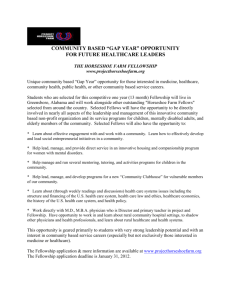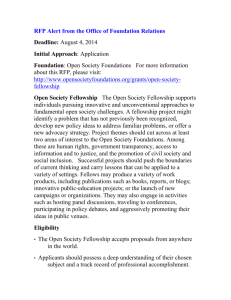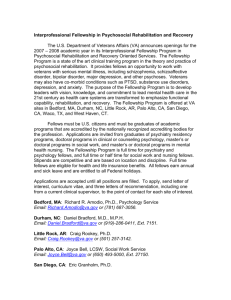Post-CCT GP Fellowship in Urgent and Acute Care Background
advertisement
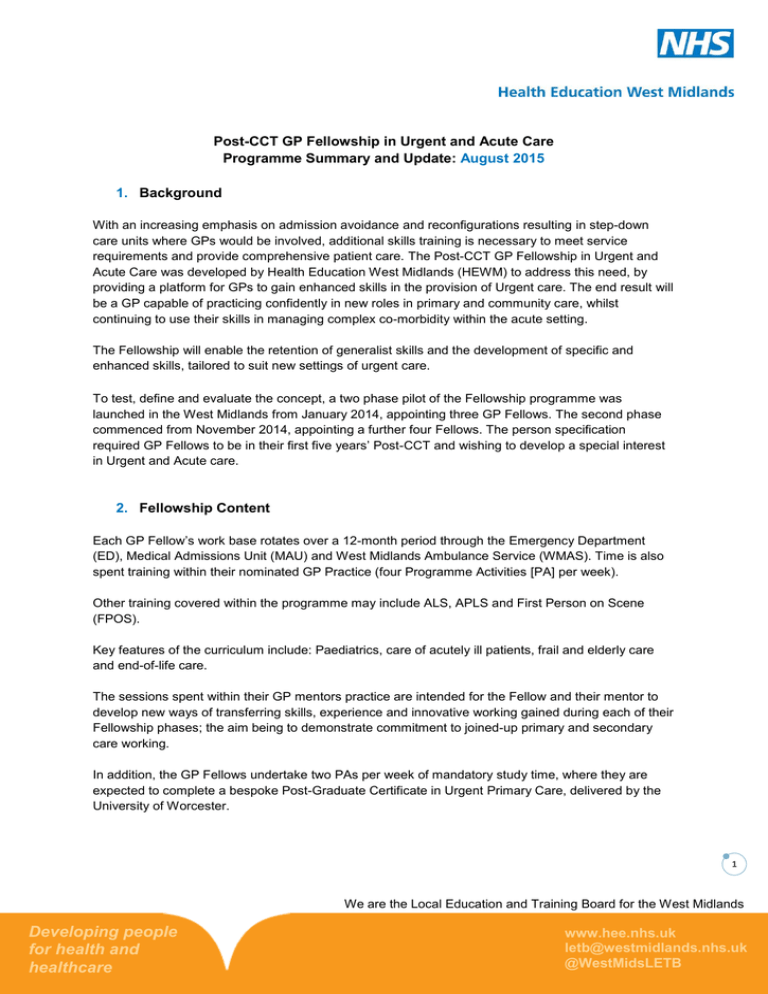
Post-CCT GP Fellowship in Urgent and Acute Care Programme Summary and Update: August 2015 1. Background With an increasing emphasis on admission avoidance and reconfigurations resulting in step-down care units where GPs would be involved, additional skills training is necessary to meet service requirements and provide comprehensive patient care. The Post-CCT GP Fellowship in Urgent and Acute Care was developed by Health Education West Midlands (HEWM) to address this need, by providing a platform for GPs to gain enhanced skills in the provision of Urgent care. The end result will be a GP capable of practicing confidently in new roles in primary and community care, whilst continuing to use their skills in managing complex co-morbidity within the acute setting. The Fellowship will enable the retention of generalist skills and the development of specific and enhanced skills, tailored to suit new settings of urgent care. To test, define and evaluate the concept, a two phase pilot of the Fellowship programme was launched in the West Midlands from January 2014, appointing three GP Fellows. The second phase commenced from November 2014, appointing a further four Fellows. The person specification required GP Fellows to be in their first five years’ Post-CCT and wishing to develop a special interest in Urgent and Acute care. 2. Fellowship Content Each GP Fellow’s work base rotates over a 12-month period through the Emergency Department (ED), Medical Admissions Unit (MAU) and West Midlands Ambulance Service (WMAS). Time is also spent training within their nominated GP Practice (four Programme Activities [PA] per week). Other training covered within the programme may include ALS, APLS and First Person on Scene (FPOS). Key features of the curriculum include: Paediatrics, care of acutely ill patients, frail and elderly care and end-of-life care. The sessions spent within their GP mentors practice are intended for the Fellow and their mentor to develop new ways of transferring skills, experience and innovative working gained during each of their Fellowship phases; the aim being to demonstrate commitment to joined-up primary and secondary care working. In addition, the GP Fellows undertake two PAs per week of mandatory study time, where they are expected to complete a bespoke Post-Graduate Certificate in Urgent Primary Care, delivered by the University of Worcester. 1 We are the Local Education and Training Board for the West Midlands Developing people for health and healthcare www.hee.nhs.uk letb@westmidlands.nhs.uk @WestMidsLETB 3. Fellowship Aims To enhance the function of the GP within the ED, Acute Medical Unit and Ambulance Service. To develop ways in which the GP can apply enhanced urgent and acute skills to support the identification, introduction and maintenance of community alternative care pathways. To raise GP interest in Urgent and Acute / Emergency Medicine career paths. To support and follow the national policy drive for improving “joined-up care, spanning GPs, social care, and A&E departments - overseen by a named GP.” 4. Intended Learning Outcomes To better understand the needs of patients, why they are attending ED and how the GPs role could be adapted to improve ED avoidance. To develop innovative ideas and share good practice of meeting the emergency medicine agenda in primary care. 5. Endorsements: th A “New Deal” for General Practice: On June 19 , Health Secretary Jeremy Hunt set out the first steps in a new deal for GPs. During his speech, he made specific reference to the Health Education West Midlands Post-CCT GP Fellowship in Urgent and Acute Care, as an exemplar for developing specific skills in future GPs. “…Building on the success of a Health Education England pilot in the West Midlands, we will incentivise a number of newly qualified GPs with an extra year of training and support to develop specific skills needed in areas such as paediatrics, mental health and emergency medicine…” Sir Keith Pearson, Chair, Health Education England (2014): There is a greater need than ever before for joined up working within our national health service. Our GP workforce must be capable of providing comprehensive care and access to community care pathways for an increasingly aged population of patients, who present with an ever-wider range of complex health issues. The Health Education West Midlands Post-CCT GP Fellowship programme addresses this need, by providing enhanced skills training for the GP of the future. This innovative scheme demonstrates that training can continue to occur across sectors, enabling patients to be seen by the right professional, in a timely manner. Interim evaluation results demonstrate that the Fellowship objectives and deliverables support: 2013 Hunt Recommendations NHS England Five Year Forward View 2015 Building The Workforce: New Deal for GPs (10 Point Plan) 2015 Primary Care Commission recommendations. 2 We are the Local Education and Training Board for the West Midlands Developing people for health and healthcare www.hee.nhs.uk letb@westmidlands.nhs.uk @WestMidsLETB 6. Pilot Cohort Awards and Stakeholder Engagement event To celebrate the achievements of the three Phase 1 pilot GP Fellows in developing the Fellowship programme, HEWM hosted an awards and stakeholder engagement event th on Thursday June 25 2015, at the University of Worcester. The event included presentation of Fellowship awards to the pilot Phase 1 Fellows: Dr Michael Clements, Dr Alwin Mascarenhas & Dr Tosin Oladini (pictured right to left). 7. Fellowship Programme Update HEWM successfully delivered a two-phase test of concept pilot, recruiting seven (7) West Midlands GP Fellows, between January 2014 and November 2015 (pilot concludes November 2015). In March 2015, Warwick Medical School delivered an interim evaluation report, covering Phase 1 of the Pilot. The evaluation confirmed fitness-for-purpose and scope for scale-andspread of the proposed Fellowship model. The programme team are currently preparing a project brief to extend the scope of the Fellowship, with four variations of the Urgent and Acute theme: Primary Care Paediatrics, Mental Health (including Veteran’s Health), Frail Elderly Community Care and Medical Education and Leadership. The brief will be delivered to Health Education West Midlands st for consultation and approval by August 21 . The extended programme proposal has been endorsed by HEE Medical Director Prof Wendy Reid and HEE Board Chair, Sir Keith Pearson. To demonstrate suitability for national scale and spread, the project team are collaborating with a team representing the three London LETBs and HE Kent, Sussex and Surrey (KSS), following a request for collaboration in providing a Pan-London and KSS Urgent and Acute Care GP Fellowship. The West Midlands model was accepted by the four Postgraduate Deans and development led by the Health Education London and Southeast Director of Education and Quality. The four LETBs will work collaboratively with HEWM, to launch their Primary Care Fellowship in Urgent and Acute Care - as a pan-London and KSS test of concept - from September 2015. Potential for scale and spread will be analysed through a combined evaluation of the PanLondon / KSS and West Midlands programmes. Evaluation will be led by the Warwick Medical School evaluation team. 3 We are the Local Education and Training Board for the West Midlands Developing people for health and healthcare www.hee.nhs.uk letb@westmidlands.nhs.uk @WestMidsLETB 8. Interim Evaluation Outcomes: Phase 1 The interim evaluation report (commissioned through Warwick Medical School, February 2015) found that the Fellowship is being enthusiastically received by those who are involved in its delivery and is successfully addressing the aims and expectations of its stakeholders. Overall, the Fellowship has proven popular with participating GPs, whether as Fellows or through the practice teams in which the Fellows were placed. Through a variety of mechanisms, the Fellowship is enhancing Ambulance Service ED and AMU service provision. The programme is successfully supporting Fellows to develop a broad range of knowledge and skills related to urgent care. The Fellows have become more adept at making best use of community-based alternative care pathways; supporting patients with acute care needs to remain outside hospital. This was widely seen to be supporting improved joined-up care across GP, community and ED settings. The pilot also revealed numerous factors that may be important to the future success of such a programme; whether West Midlands-based or nationally. For the Fellows themselves, the scheme was felt to have been an exciting and challenging opportunity, unlike anything that they had encountered before. Their experience of the Fellowship was very different to what they had expected, but surpassed their expectations. Participating in the scheme has extended the Fellows’ scope of practice and enhanced their selfconfidence, academic and leadership skills. Fellows described feeling better able to lead and educate their primary care and secondary care colleagues, in how best to utilise community- based services and help patients avoid unnecessary hospital admissions. 9. Evaluation Parameters: Phase 2: The evaluation of the second phase of the pilot commenced in June 2015. The final report - covering both pilot phases - will be due by December 2015. The evaluation will once again be led by Prof Jeremy Dale, Professor of Primary Care at Warwick Medical School. Phase 2 of the pilot will provide an opportunity to evaluate: The transferability and implementation of the fellowship scheme; The organisational impact associated with different employment arrangements; The extent to which some of the Phase 1 challenges have been addressed. 4 We are the Local Education and Training Board for the West Midlands Developing people for health and healthcare www.hee.nhs.uk letb@westmidlands.nhs.uk @WestMidsLETB A. Key Questions To what extent is the scheme addressing the project brief and the aims, expectations and aspirations of its key stakeholders (GP Fellows, clinical supervisors, staff within the Fellowship settings, NHS Trusts, HEWM, Worcester University etc)? What, if any, are the gaps between expectations and experience? How does the implementation of the second phase of the pilot compare to that of the first phase? What are the benefits and organisational impacts associated with different employment arrangements? What impact is the Fellowship having on the function of the Fellow within general practice, ED, AMU and Ambulance Service teams? How can the scheme be further improved or developed to support scaling up and region-wide / national implementation? B. Evaluation Methodology A similar methodology to Phase 1 is proposed, with stakeholder interviews, observation of the fellows working within each of the clinical settings, and analysis of activity data. The four Phase 2 GP Fellows and key stakeholders were interviewed in June 2015, with follow-up interviews scheduled for December 2015; the aim being to provide mid-year and year-end perspectives. The interviews will be semi-structured, digitally recorded and will focus on the key questions listed at (A). In order to minimise disruption, interviews will be undertaken at a time that is convenient to the interviewee and when possible, by phone. Each interview will be between 15 and 30 minutes in length. Each of the clinical settings in which the fellows are working will be visited on at least two occasions, to observe the working environments, the extent to which the Fellows have integrated with their clinical teams and to seek team members’ views of the scheme and its impact on clinical service delivery. Quantitative data will be sought from project Trusts, GP practices and Fellows, to describe the trainees’ workload; specifically: patients seen, case mix and outcomes. In addition, for a four month period (July - October 2015) each Fellow will be asked to keep a daily log, which will record data relating to the numbers of patients seen, demographics (age / sex), presentation and outcome of the consultation. C. OUTPUTS Preliminary report on early findings due by September 2015. Final report covering both phases of the pilot to HEWM by December 2015, highlighting key learning points and evidence that should inform the future roll out of the fellowship scheme. Dissemination in health service (e.g. HSJ) and academic journals (e.g. British Journal of General Practice) of key findings relating to the development and implementation of the scheme. 5 We are the Local Education and Training Board for the West Midlands Developing people for health and healthcare www.hee.nhs.uk letb@westmidlands.nhs.uk @WestMidsLETB D. Data Analysis A combination of quantitative and qualitative analyses will be performed to interpret the data, and hence answer the key questions listed above. i. Quantitative: Descriptive statistics to describe the workload data. ii. Qualitative: A thematic Framework approach will be used to analyse responses to interview questions. The evaluation will summarise and map responses, to identify key themes that emerge. Summary The complex challenges facing the NHS of an ageing population, presenting with multiple comorbidities, requires a “cross fertilisation” of knowledge, practice and ideas. The Fellowship scheme is well-placed to catalyse this at local level. The success of the pilot provides evidence that can inform future NHS strategy and policy. The Fellowship has proven feasibility and provides a model for up-skilling GPs to work in an enhanced way across primary care, urgent care and emergency care settings. GP Fellows can and will support admission avoidance and make greater use of community-based alternative care pathways. The programme has and continues to challenge traditional barriers, which have previously resulted in patients receiving fragmented, inappropriate and costly care. Prof Liz Hughes (Director of Education and Quality, Health Education London and Southeast) Prof Jeremy Dale (Professor of Primary Care, University of Warwick Medical School) Matt Aiello (Special Projects Manager, Health Education West Midlands) rd 3 August 2015 6 We are the Local Education and Training Board for the West Midlands Developing people for health and healthcare www.hee.nhs.uk letb@westmidlands.nhs.uk @WestMidsLETB


